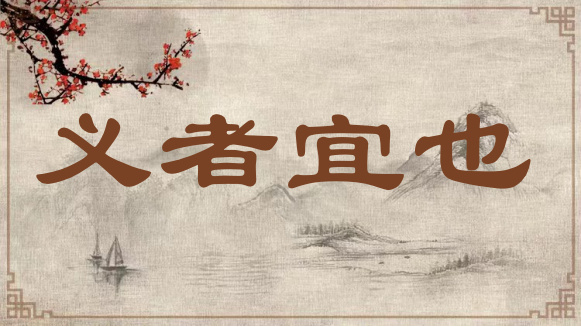Yi (Righteousness) is Proper and Suitable Action

所谓义,就是做事适宜。出自《礼记·中庸》。它既是关于“义”的界说,也是治理国家、社会的一条重要原则。其深意在于使人及万物各得其宜,包括因地制宜、因时制宜、因人制宜等;其最高境界是使人及万物依照自身固有的内在规定性自我展开,更好地成为其自身。它是人为与自然相融合的治理观,也是应然与必然相统一的责任观和正义观。
Yi (义) means acting appropriately and doing things properly. The expression comes from The Book of Rites. It not only defines yi, but also refers to an important principle of state and social governance, that is, humans and all living things must act appropriately in line with the actual circumstances, to suit both the time and the individual. At the highest level, it means that all living things must follow their intrinsic nature to grow and become their best. It is an idea of governance that integrates the man-made and the natural, and also a view of responsibility and justice that is both necessary and inevitable.
引例 Citations:
◎义者宜也,尊贤为大。(《礼记·中庸》)
所谓义,就是做事适宜,其中尊重贤人最为重要。
Yi means acting appropriately, of which respect for the sages is the most important. (The Book of Rites)
◎义,宜也,裁制事物使合宜也。(刘熙《释名·释言语》)
所谓义,就是做事适宜,就是规划、安排事物,使之各得其宜。
Yi means doing things appropriately, that is, planning and arranging properly so that each is in its suitable place. (Liu Xi: Explanation of Terms)
推荐:教育部 国家语委
供稿:北京外国语大学 外语教学与研究出版社
责任编辑:钱耐安





